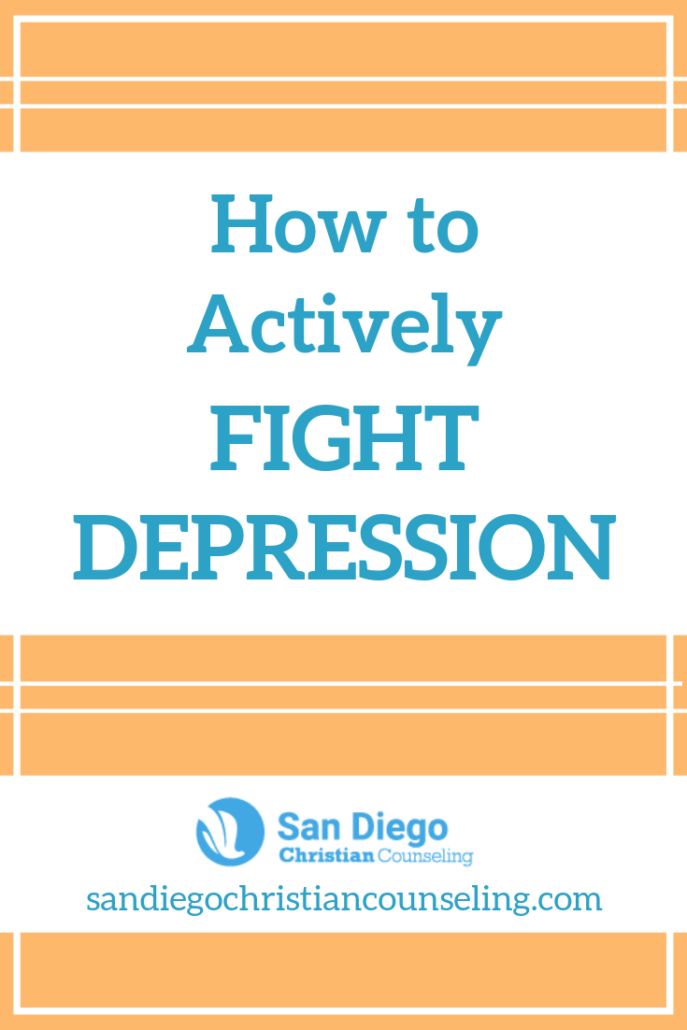When depression strikes, it infiltrates every area of life including your thoughts, feelings, and actions. According to the World Health Organization (WHO), there are more than 300 million people who suffer from depression across the globe.
![]() Depression has a way of preventing people from even seeking out healthy ways to combat its effects. For the person experiencing depression, it can literally feel like nothing will make your situation better. However, there are some practical steps to actively fight depression in your life.
Depression has a way of preventing people from even seeking out healthy ways to combat its effects. For the person experiencing depression, it can literally feel like nothing will make your situation better. However, there are some practical steps to actively fight depression in your life.
Depression is serious and identifying a proper treatment plan and finding help is going to improve your chances of recovery significantly. Unfortunately, depression is multifaceted and simply trying to “change your attitude” often isn’t the remedy for such a dynamic disorder. San Diego Christian Counseling offers the support needed for effective treatment.
The first step is to understand the common symptoms of depression and determine if you are experiencing these systems regularly. These symptoms must be present for at least two weeks to be diagnosed. Some symptoms of depression described by the Diagnostic and Statistical Manual of Mental Disorders, Fifth Edition (DSM-5) are:
- Depressed, negative or sad mood
- Dwindling interest or excitement in things you once enjoyed
- Serious weight loss or weight gain
- Insomnia or hypersomnia
- Energy levels plummet
- Feelings of worthlessness or inappropriate guilt
- Difficulty staying focused
- Indecisiveness and suicidal thoughts
These symptoms can interrupt your abilities to work, complete personal tasks, or interact with friends.
Depression is extremely common and is not a sign of weakness. Many of those who suffer from depression battle the disorder in isolation due to feelings of being ostracized by others. Unfortunately, a big stigma around depression still exists today.
When a person is in a car accident and injured, family and friends might gather around at the hospital to show their support. However, because depression often isn’t defined in tangible ways, people find it hard to discuss it with others. Many people who would have compassion on someone with a broken arm, don’t have the same compassion on someone facing a mental disorder.
People learn to suffer in silence instead of searching for someone they can trust to share their experiences with. Every individual is unique and finding ways to overcome depression might look different than someone else’s approach. Find safe people in your circle that you can confide in and extend grace to yourself as you learn to actively fight depression. The good news is that many people are finding ways to cope and hope is not lost.
Identify Fact vs. Opinion
 Everybody has an opinion about depression and how to manage the disorder. Usually, people who have never experienced depression or interacted with someone who has, believe people can just shake depression off and suck it up. Misinformation is circulated frequently about depression and how it influences people.
Everybody has an opinion about depression and how to manage the disorder. Usually, people who have never experienced depression or interacted with someone who has, believe people can just shake depression off and suck it up. Misinformation is circulated frequently about depression and how it influences people.
If depression were that simple, then millions of people wouldn’t find themselves struggling with it daily. You can’t just stop being depressed on command. If someone has told you to stop feeling depressed or that if you just had more faith you would be healed, it is unfortunate that you were subjected to such narrow-minded perspectives.
God does not love you any less because you are battling depression. He is with you. He hurts to see you hurting. He can help you on your journey toward recovery.
9 Ways to Actively Fight Depression
It’s important to note that this journey requires patience. Everybody experiences depression symptoms differently and each person will discover the process that works best for their unique circumstances.
Allow your mind, body, and spirit to heal the way that is best for YOU. Refrain from comparing your journey to someone else’s journey. Let’s take a look at what other people have done to fight their depression.

Avoid isolating yourself
This is major. It’s natural to want to isolate yourself when you’re depressed. It’s almost like keeping to yourself becomes the default during a depressive state. Your thoughts become trapped in your mind and you avoid connection with others.
Depression can worsen when you are around joyful people. You begin to wonder if you’ll ever be that person enjoying an abundant life. You are not alone in this way of thinking and behaving. Isolation increases the severity of depression.
You will have to push through your discomfort to connect with people. This can be hard and feel like you are going against the grain, but having face-to-face time with those that care about you eases the symptoms of depression. Find those that remind you that you are loved and valuable.
It’s okay to have time to yourself, but don’t be afraid to bring your whole self to the dinner table with a friend. A genuine friend cares about you during the valleys and mountaintops. Getting outside of those conflicting thoughts and talking to someone else will help.
Leave your house
Many people who are experiencing depression lock themselves in their house, pull the covers over their head and watch shows that aren’t beneficial in their current state. Do what you can to get out of the home and participate in a life-giving activity. Even if you don’t feel any different, removing yourself from isolation helps gradually over time. Even if it’s taking a walk in a nature park or driving to a place you’ve never been. Staying in the house is comfortable, but counterproductive to your healing and progress.
Don’t believe the lies in your head
 The mind is a battlefield and a constant tug-of-war between good and evil. Being lost in your own thoughts is incredibly dangerous in a depressive state. It’s easy to succumb to lies during this time. These thoughts might sound like, “Nobody likes me,” “Why am I even still here,” “I’m worthless,” or “I’ll never get anything right.”
The mind is a battlefield and a constant tug-of-war between good and evil. Being lost in your own thoughts is incredibly dangerous in a depressive state. It’s easy to succumb to lies during this time. These thoughts might sound like, “Nobody likes me,” “Why am I even still here,” “I’m worthless,” or “I’ll never get anything right.”
Our internal dialogues determine our direction. These thoughts are not from God and can derail your healing. Lies can be hard to reject when depressed. It’s important to have someone else who can speak truth into your life and remind you who you are in Christ. Other people will be able to pinpoint the thoughts that are blatant lies. These lies can consume your mind and eat away at your mood.
Get active
Even on a good day, most people dread exercising. It’s normal to have to give yourself a pep talk to make it to the gym. That being said, incorporating movement in your day is going to be challenging, but critical to fighting depression symptoms. Exercise is known to release your body’s chemicals that help you feel better.
Depression makes it incredibly hard to get motivated because of a lack of energy. Even if you can lace up your tennis shoes and walk around the neighborhood for 15 minutes. That is a great start to getting moving. This movement, when done consistently, will benefit you tremendously. Fresh air, a dose of sunlight, moving and immersing yourself in nature boosts moods. You might even want to invite someone else along to keep you accountable.
Practice proper nutrition
Food is fuel. What we put into our body contributes toward our overall health emotionally, mentally and physically. If we fill our bodies with unhealthy food or drinks we can’t expect that our body will be efficient. Our bodies will become sluggish as a result. Adding enough protein, vegetables, fruit and eating balanced meals is important. Hydrating yourself with water is also a big deal.
I know this suggestion might seem elementary, but often when people are depressed they skip meals or binge on food that isn’t healthy. When energy levels are low, attempting to cook a meal for yourself seems like an insurmountable task. Find prepared foods that are healthy that you can rely on to fuel you.
Some people turn to alcohol or drugs to numb their pain or make them feel alive. Alcohol is a depressant and will make things worse. Any substance that alters your mood should be avoided. If you are self-medicating, please know that other options exist to help manage depression and overcome its power.
Talk to God
 Depressed people often drift away from God instead of clinging to him. You might begin to question why God would let you suffer from depression or why he won’t just make your pain go away. God doesn’t want you to live a depressed life. He wants you to live an abundant life.
Depressed people often drift away from God instead of clinging to him. You might begin to question why God would let you suffer from depression or why he won’t just make your pain go away. God doesn’t want you to live a depressed life. He wants you to live an abundant life.
He is by our side in the good and bad times.
When depression hits, it’s more important than ever to seek him minute-by-minute to be your strength and guide you every step of the way. If you are involved in a church, reach out to your community to provide comfort and encouragement. You might want to look for a church program like Celebrate Recovery to get involved with. Don’t give up asking God and His people for help. Believers are here to comfort those with the same comfort they have received.
Read God’s Word
Absorb God’s Word and meditate on his promises. God gives us life-giving words on the pages of the bible that we can access and apply. Here are a few verses that display God’s promises.
I waited patiently for the Lord; he turned to me and heard my cry. He lifted me out of the slimy pit, out of the mud and mire; he set my feet on a rock and gave me a firm place to stand. He put a new song in my mouth, a hymn of praise to our God. Many will see and fear the Lord and put their trust in him. – Psalm 40:1-3
The righteous cry out, and the Lord hears them; he delivers them from all their troubles. – Psalm 34:17
He heals the brokenhearted and binds up their wounds. – Psalm 147:3
A bruised reed he will not break, and a smoldering wick he will not snuff out. – Isaiah 42:3
Try Therapy for Depression
It can be useful to have an outsider’s perspective on depression. A trained therapist has the experience to help you navigate the complexities of depression and even uncover the source of the pain. Therapy is another good tool to use in addition to the others mentioned in this article.
A professional therapist has years of experience and training and can give you resources custom-tailored to your situation. A therapist also provides a safe place to share and be vulnerable without any repercussions. Talking is an important way to combat depression.
Talk with a medical provider
If you find medication is the best solution for you, this does not mean that you’ve failed or even that you will need to take medication forever. Many people I know have weaned themselves off medication after some time. Medical intervention is necessary at times and not something to be ashamed about.
There are also other options to treat depression that a professional medical provider could review with you. Remember, using medicine doesn’t mean that you aren’t still trusting God for your healing. God can provide healing in a variety of ways.
Christian Counselors are Ready to Help
Christian counselors at San Diego Christian Counseling are ready to talk with you today in a judgment-free environment. You are not alone and you do not have to battle this alone either. Now is the time to find someone you trust and begin the journey to actively fight depression. Find someone who will be by your side no matter what. Reach out today to a trusted friend, family member or professional. Help is only a phone call or text away.
“Depressed”, Courtesy of Rawpixel, Unsplash.com, CC0 License; “Down”, Courtesy of Ethan Sykes, Unsplash.com, CC0 License; “Depressed”, Courtesy of Nathan Cowley, Pexels.com, CC0 License; “Help,” courtesy of Ben White, unsplash.com, Public Domain License


